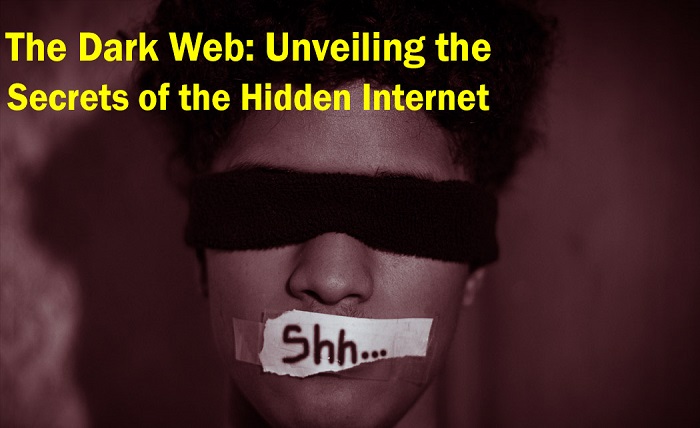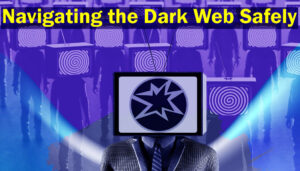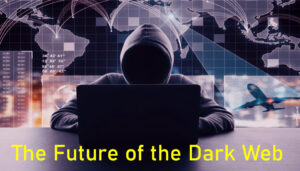The Dark Web: Unveiling the Secrets of the Hidden Internet

The internet is a vast and expansive realm, but there exists a hidden side that few have ventured into—the Dark Web. Far beyond the reach of search engines and traditional browsing, the Dark Web is a mysterious and enigmatic world that harbors secrets, illicit activities, and anonymity. In this article, we delve into the depths of the Dark Web, shedding light on its inner workings, its purpose, and the risks and rewards it holds.
Understanding the Dark Web
The Dark Web is a part of the internet that operates on encrypted networks, such as Tor, I2P, or Freenet, which enable users to maintain anonymity and privacy. Unlike the surface web, which is accessible to anyone with an internet connection, the Dark Web requires specific software and configurations to access. It provides a platform for various activities that range from illegal marketplaces, hacking forums, and whistleblowing platforms, to private communication channels.
The Layers of Anonymity
To navigate the Dark Web, users often rely on Tor, also known as The Onion Router. Tor works by encrypting and routing internet traffic through a series of relays, obscuring the user’s identity and location. This multi-layered approach provides an added layer of anonymity, making it challenging for authorities to trace individuals engaging in illicit activities.
Dark Web Marketplaces
One prominent aspect of the Dark Web is its underground marketplaces, where illicit goods and services are bought and sold. These marketplaces operate anonymously, facilitating transactions involving drugs, counterfeit currency, weapons, hacking tools, stolen data, and more. Cryptocurrencies, such as Bitcoin, are commonly used for transactions, further protecting the identities of buyers and sellers.
The Risks and Dangers
While the Dark Web offers anonymity and freedom from surveillance, it is not without risks. Users must navigate through a labyrinth of scams, malware, and law enforcement operations targeting illegal activities. Identity theft, financial loss, and exposure to explicit or disturbing content are significant concerns. Engaging in illegal activities on the Dark Web can also lead to legal repercussions, as law enforcement agencies are actively monitoring and infiltrating criminal networks.

Staying Safe on the Dark Web
For those venturing into the Dark Web, safeguarding personal information and maintaining online security is paramount. Utilizing a combination of security measures, such as virtual private networks (VPNs), encrypted messaging apps, and practicing good browsing habits, can enhance safety and protect against potential threats. However, it is essential to remember that absolute anonymity on the Dark Web is challenging to achieve.
The Dark Web’s Role in Society
While the Dark Web has gained notoriety for its association with illegal activities, it also serves as a platform for whistleblowers, journalists operating in repressive regimes, and individuals seeking to protect their privacy. It has played a pivotal role in exposing corruption, promoting free speech, and facilitating communication in regions where internet access is heavily censored.
The Dark Web remains an intriguing and complex entity, enticing individuals with its veil of secrecy. It offers a glimpse into the hidden aspects of the internet, showcasing both the benefits and risks associated with such anonymity. Understanding the Dark Web can provide valuable insights into the underbelly of cyberspace, highlighting the importance of responsible use and a cautious approach when venturing into its depths.
Remember, exploring the Dark Web comes with inherent risks, and engaging in illegal activities can have severe consequences. Proceed with caution, prioritize your safety and privacy, and always adhere to the laws and regulations of your jurisdiction.
The Dark Web continues to captivate our curiosity as we seek to unravel the mysteries that lie beneath the surface of the internet. In this article, we dive deeper into the enigmatic realm of the Dark Web, shedding light on its inner workings, the hidden dangers it harbors, and the measures one can take to navigate this shadowy landscape.
The Intricacies of the Dark Web
The Dark Web operates on encrypted networks, creating an anonymous space where users can browse, communicate, and engage in various activities away from the prying eyes of conventional search engines and surveillance. Accessing the Dark Web requires specialized software, such as the Tor browser, which allows users to navigate through hidden websites with “.onion” domains.

Unveiling Dark Web Marketplaces
One of the most prominent features of the Dark Web is its clandestine marketplaces. These underground marketplaces serve as hubs for illegal trade, where vendors offer a wide array of goods and services that range from drugs, stolen data, hacking tools, counterfeit documents, and even hired cybercriminal services. Cryptocurrencies, such as Bitcoin, are commonly used for transactions due to their pseudo-anonymous nature.
The Dark Side of Anonymity
While the Dark Web offers a cloak of anonymity, it also poses significant risks. Users must tread carefully, as scams, phishing attempts, and malicious actors lurk in the shadows. Malware, ransomware, and identity theft are ever-present threats. Law enforcement agencies have also intensified their efforts to track down individuals involved in illegal activities on the Dark Web, aiming to dismantle criminal networks.
Read more about: yandek.click
Navigating the Dark Web Safely
For those venturing into the Dark Web, taking precautionary measures is crucial. Utilizing a virtual private network (VPN) can enhance anonymity by masking one’s IP address and encrypting internet traffic. Additionally, adopting strong security practices, such as using reputable anti-malware software, employing strong passwords, and keeping software up to date, can help mitigate risks.
Ethics and Legal Considerations
The Dark Web exists as a realm where illegal activities thrive, but it is essential to note that engaging in such activities is both unethical and against the law. The line between curiosity and criminal intent is thin, and individuals must understand the legal implications and potential consequences of their actions. Responsible use of the internet, both on the surface web and the Dark Web, is crucial for maintaining a safe and lawful online environment.
The Impact on Society
Beyond its association with criminal activities, the Dark Web has also served as a platform for activism, privacy advocacy, and circumventing censorship. Journalists, whistleblowers, and individuals living under oppressive regimes have utilized the Dark Web to protect their identities, share sensitive information, and fight for freedom of expression. It is important to recognize the potential positive impact that can arise from the anonymity and privacy afforded by the Dark Web.

The Dark Web remains a mysterious realm that continues to intrigue and fascinate. It is a place of hidden opportunities, as well as lurking dangers. Exploring the Dark Web requires caution, an understanding of its risks, and a commitment to ethical behavior. As we navigate the depths of the hidden internet, let us remember the importance of responsible online conduct, the preservation of privacy, and the adherence to the laws and regulations that govern our digital world.
The Dark Web, with its elusive nature and hidden corners, continues to capture our imagination and curiosity. In this article, we embark on a deeper exploration of the Dark Web, shedding light on its multifaceted aspects and the impact it has on our digital landscape.
Decentralization and Anonymity
At the core of the Dark Web lies its decentralized nature, which sets it apart from the conventional internet. The use of overlay networks, such as Tor, I2P, and Freenet, empowers users with anonymity and privacy. By routing internet traffic through multiple nodes, these networks obscure the source and destination of data, safeguarding user identities.
Dark Web Markets and Cryptocurrencies
One of the prominent features of the Dark Web is its thriving marketplace for illicit goods and services. These marketplaces, often accessed through hidden URLs, facilitate transactions involving drugs, weapons, stolen data, and other contraband. Cryptocurrencies, particularly Bitcoin, are the preferred medium of exchange due to their pseudonymous nature, enabling discreet transactions.
Challenges and Risks
While the Dark Web offers anonymity and privacy, it also harbors numerous risks and challenges. Scammers, hackers, and malicious actors abound, seeking to exploit unsuspecting users. Phishing attempts, malware-infected downloads, and social engineering schemes are prevalent. Users must exercise caution and employ security measures to protect themselves from potential threats.
Legal and Ethical Considerations
Engaging with the Dark Web raises significant legal and ethical questions. It is important to recognize that while the Dark Web may host legitimate activities, it also facilitates illegal practices. Users must navigate these waters with a keen awareness of the boundaries of legality and ethical conduct. Participating in illegal activities not only carries legal consequences but also contributes to the perpetuation of illicit markets.

Balancing Privacy and Security
The Dark Web exists as a response to the erosion of privacy on the surface web. It provides a platform for individuals to exercise their right to privacy, evade surveillance, and circumvent censorship. However, this emphasis on privacy also creates challenges for law enforcement agencies combating cybercrime. Striking a balance between privacy and security remains a complex and ongoing debate.
Tools for Protection
For those who choose to explore the Dark Web, employing protective measures is paramount. Utilizing reputable virtual private networks (VPNs) adds an extra layer of security by encrypting internet traffic and masking IP addresses. Implementing strong and unique passwords, employing two-factor authentication, and regularly updating software can further fortify one’s online defenses.
Responsible Exploration
The Dark Web, with its allure and intrigue, should be approached with caution and responsibility. It is crucial to remember that engaging in illegal activities not only carries legal repercussions but also perpetuates the harmful aspects of the Dark Web. Responsible exploration involves staying informed, understanding the risks, and adhering to legal and ethical boundaries.
The Future of the Dark Web
As technology evolves, the Dark Web will continue to adapt and transform. Law enforcement agencies are constantly refining their strategies to combat cybercrime, and advancements in cybersecurity aim to expose vulnerabilities within the Dark Web infrastructure. Meanwhile, privacy advocates strive to protect individual freedoms and champion the importance of online anonymity.

Conclusion
The Dark Web remains a captivating and enigmatic part of the internet, shrouded in secrecy and riddled with complexities. It serves as a stark reminder of the dual nature of technology—offering both opportunities and risks. As users of the internet, it is our responsibility to navigate the digital landscape with awareness, discretion, and a commitment to ethical conduct. By doing so, we can better understand the Dark Web and its implications, while safeguarding ourselves and the online ecosystem we inhabit.




